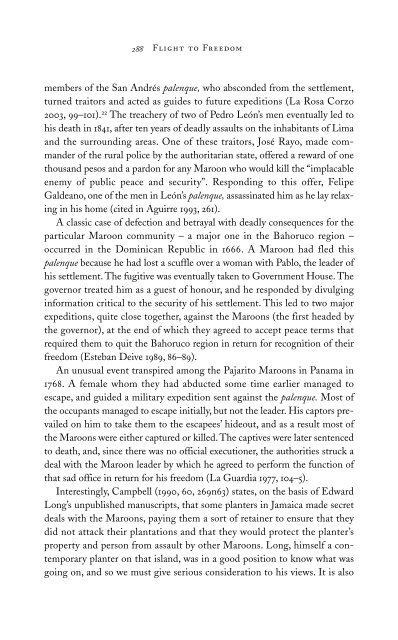60199616-flight-to-freedom-african-runaways-and-maroons-in-the-americas
60199616-flight-to-freedom-african-runaways-and-maroons-in-the-americas
60199616-flight-to-freedom-african-runaways-and-maroons-in-the-americas
Create successful ePaper yourself
Turn your PDF publications into a flip-book with our unique Google optimized e-Paper software.
288 Flight <strong>to</strong> Freedom<br />
members of <strong>the</strong> San Andrés palenque, who absconded from <strong>the</strong> settlement,<br />
turned trai<strong>to</strong>rs <strong>and</strong> acted as guides <strong>to</strong> future expeditions (La Rosa Corzo<br />
2003, 99–101). 22 The treachery of two of Pedro León’s men eventually led <strong>to</strong><br />
his death <strong>in</strong> 1841, after ten years of deadly assaults on <strong>the</strong> <strong>in</strong>habitants of Lima<br />
<strong>and</strong> <strong>the</strong> surround<strong>in</strong>g areas. One of <strong>the</strong>se trai<strong>to</strong>rs, José Rayo, made comm<strong>and</strong>er<br />
of <strong>the</strong> rural police by <strong>the</strong> authoritarian state, offered a reward of one<br />
thous<strong>and</strong> pesos <strong>and</strong> a pardon for any Maroon who would kill <strong>the</strong> “implacable<br />
enemy of public peace <strong>and</strong> security”. Respond<strong>in</strong>g <strong>to</strong> this offer, Felipe<br />
Galdeano, one of <strong>the</strong> men <strong>in</strong> León’s palenque, assass<strong>in</strong>ated him as he lay relax<strong>in</strong>g<br />
<strong>in</strong> his home (cited <strong>in</strong> Aguirre 1993, 261).<br />
A classic case of defection <strong>and</strong> betrayal with deadly consequences for <strong>the</strong><br />
particular Maroon community – a major one <strong>in</strong> <strong>the</strong> Bahoruco region –<br />
occurred <strong>in</strong> <strong>the</strong> Dom<strong>in</strong>ican Republic <strong>in</strong> 1666. A Maroon had fled this<br />
palenque because he had lost a scuffle over a woman with Pablo, <strong>the</strong> leader of<br />
his settlement. The fugitive was eventually taken <strong>to</strong> Government House. The<br />
governor treated him as a guest of honour, <strong>and</strong> he responded by divulg<strong>in</strong>g<br />
<strong>in</strong>formation critical <strong>to</strong> <strong>the</strong> security of his settlement. This led <strong>to</strong> two major<br />
expeditions, quite close <strong>to</strong>ge<strong>the</strong>r, aga<strong>in</strong>st <strong>the</strong> Maroons (<strong>the</strong> first headed by<br />
<strong>the</strong> governor), at <strong>the</strong> end of which <strong>the</strong>y agreed <strong>to</strong> accept peace terms that<br />
required <strong>the</strong>m <strong>to</strong> quit <strong>the</strong> Bahoruco region <strong>in</strong> return for recognition of <strong>the</strong>ir<br />
<strong>freedom</strong> (Esteban Deive 1989, 86–89).<br />
An unusual event transpired among <strong>the</strong> Pajari<strong>to</strong> Maroons <strong>in</strong> Panama <strong>in</strong><br />
1768. A female whom <strong>the</strong>y had abducted some time earlier managed <strong>to</strong><br />
escape, <strong>and</strong> guided a military expedition sent aga<strong>in</strong>st <strong>the</strong> palenque. Most of<br />
<strong>the</strong> occupants managed <strong>to</strong> escape <strong>in</strong>itially, but not <strong>the</strong> leader. His cap<strong>to</strong>rs prevailed<br />
on him <strong>to</strong> take <strong>the</strong>m <strong>to</strong> <strong>the</strong> escapees’ hideout, <strong>and</strong> as a result most of<br />
<strong>the</strong> Maroons were ei<strong>the</strong>r captured or killed. The captives were later sentenced<br />
<strong>to</strong> death, <strong>and</strong>, s<strong>in</strong>ce <strong>the</strong>re was no official executioner, <strong>the</strong> authorities struck a<br />
deal with <strong>the</strong> Maroon leader by which he agreed <strong>to</strong> perform <strong>the</strong> function of<br />
that sad office <strong>in</strong> return for his <strong>freedom</strong> (La Guardia 1977, 104–5).<br />
Interest<strong>in</strong>gly, Campbell (1990, 60, 269n63) states, on <strong>the</strong> basis of Edward<br />
Long’s unpublished manuscripts, that some planters <strong>in</strong> Jamaica made secret<br />
deals with <strong>the</strong> Maroons, pay<strong>in</strong>g <strong>the</strong>m a sort of reta<strong>in</strong>er <strong>to</strong> ensure that <strong>the</strong>y<br />
did not attack <strong>the</strong>ir plantations <strong>and</strong> that <strong>the</strong>y would protect <strong>the</strong> planter’s<br />
property <strong>and</strong> person from assault by o<strong>the</strong>r Maroons. Long, himself a contemporary<br />
planter on that isl<strong>and</strong>, was <strong>in</strong> a good position <strong>to</strong> know what was<br />
go<strong>in</strong>g on, <strong>and</strong> so we must give serious consideration <strong>to</strong> his views. It is also


